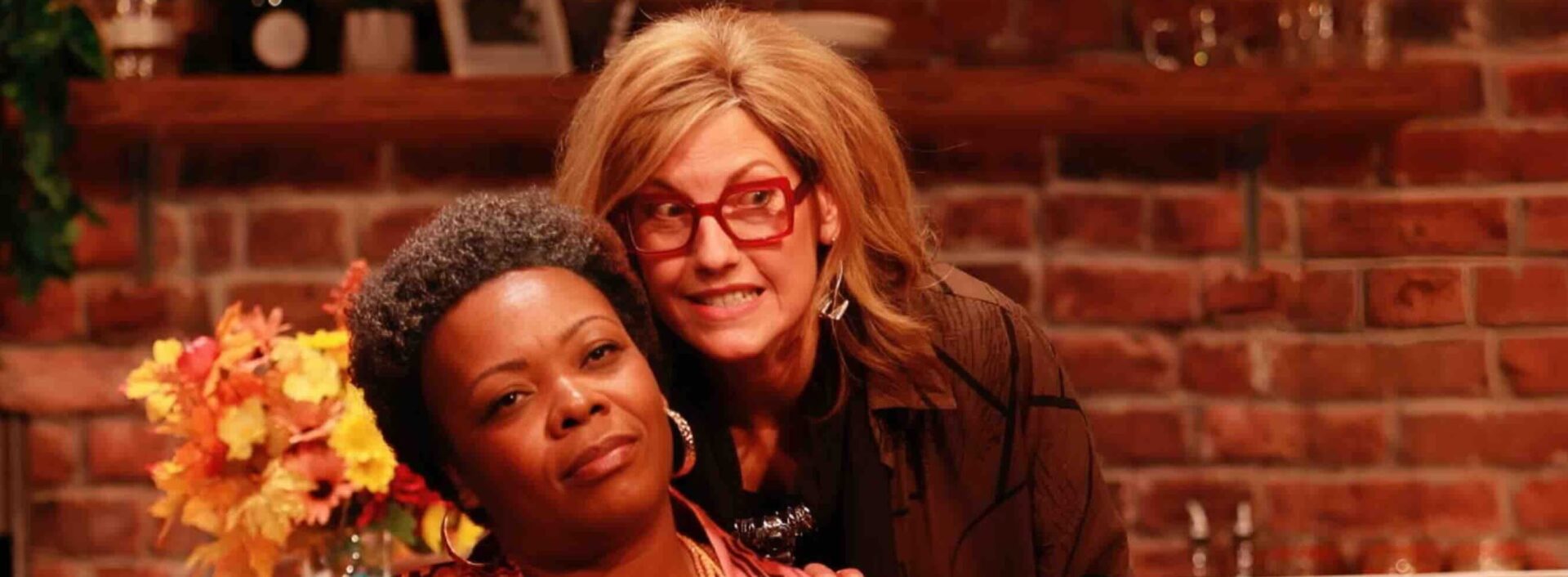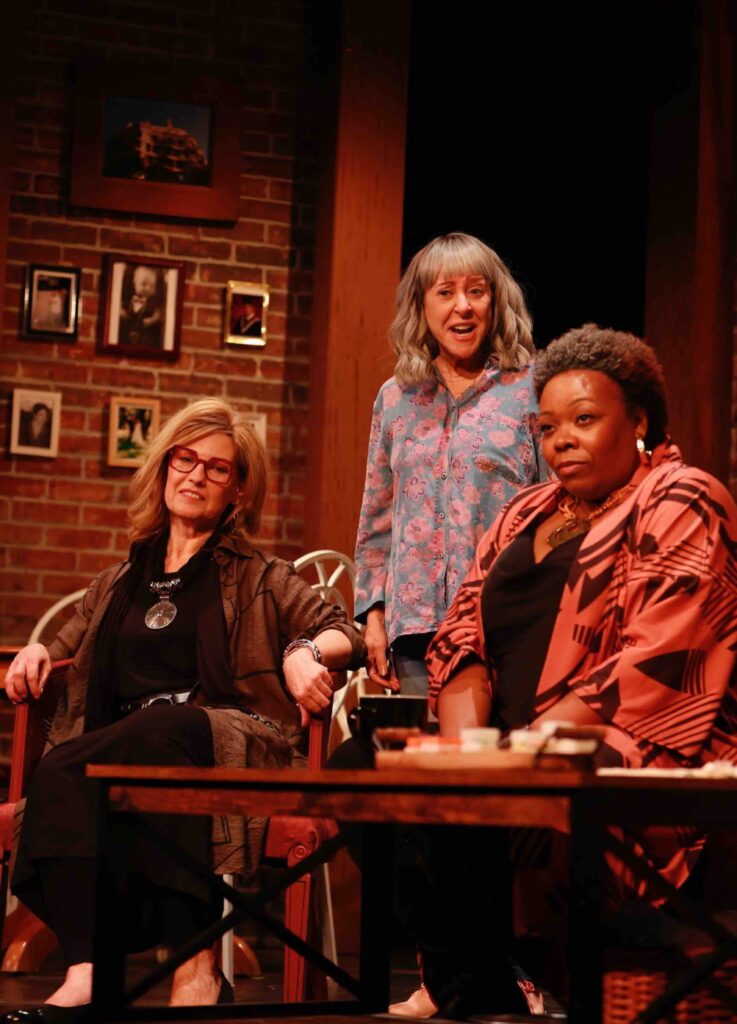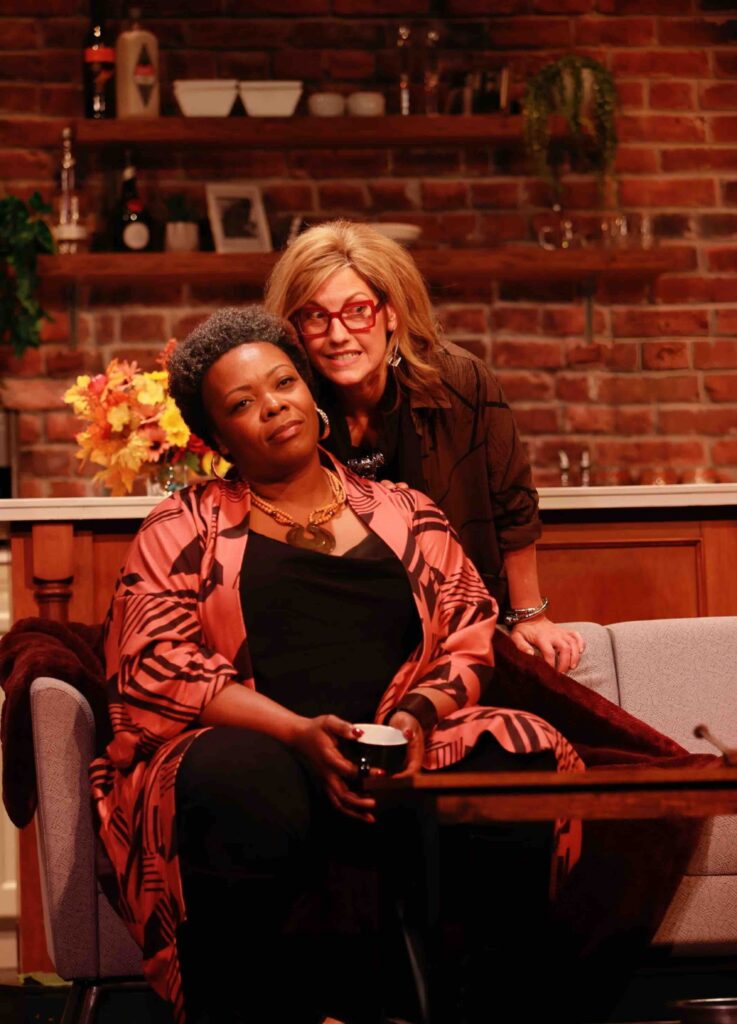REVIEW: Four lives through a friendship lens

20th Century Blues at Village Theatre Waterdown explores a quartet of women’s experiences in navigating later middle age.
Onstage at Village Theatre Waterdown until Nov. 23 is American playwright and screenwriter Susan Miller’s 2016 play, 20th Century Blues. Its strength and its draw is in its focus on the lives of modern women in later middle age, a period of transitions, competing priorities, and the renegotiation of personal identity.
The show is directed by Jerrold Karch, a long-time theatre-maker directing his first show with Village Theatre Waterdown. He has worked at the Shaw Festival and The Second City, and has directed productions across the region in Toronto, Oakville, Hamilton and Burlington.
In 20th Century Blues, celebrated photographer Danny (Karen Gaudun) is hosting a yearly get-together at her New York apartment, gradually joined by quirky veterinarian Gabby (Harriet Rice), long-time, respected journalist Mac (Zakiya Toby-Erwig), and body-conscious real estate agent Sil (Lisa Weeks). Danny has been taking photos of the group for decades, and as her career retrospective exhibition is coming up, has a big request in store.
One way in which the production succeeds is in portraying the vitality and liveliness of four diverse modern women experiencing late middle age. By rights the play could be called 21st Century Blues, as the play feels current and relevant to the lives many women (and men) are leading today. Karch alludes to an existential shift that has taken place in the conception of aging and later life in our society: “There was a time, not that long ago, that when you hit mid-sixties, you should basically slow down, sit in a rocker on the front porch and watch the world go by. But NOT for the four ladies in this story.”
Not in the least. Even if at least one of them has signed up for the AARP newsletter (the major U.S. nonprofit for retired people and those over 50), each of the women has a busy calendar that means they aren’t able to get together as much as they’d like. Not only are these four women still working, they are drawing meaning from their careers and their professional identities. These professional identities are complicated, however, by changing technologies, work expectations, as well as ageism and youth-centred culture.
“There are so many themes in this play,” Karch says. “Adoption, breast cancer, going grey, plastic surgery, dementia, letting go, sexuality and … sex itself.”
For me, it sometimes seems as though the story is loaded up with too many themes, trying to give voice to as many social issues as it possibly can. And yet, it is true that life rarely gifts us the time to focus on just one thing; especially for the “sandwich generation,” especially for moms and adult daughters and caregivers, there are always multiple, competing draws on time and energy.
As I have reflected on the play since viewing the performance, I have come to the conclusion that most of my criticisms relate to the script and Miller’s structuring of her story, which is, of course, out of the cast’s hands. I’m not sure, for instance, that I’m a fan of the book-ending of the story with TED Talk-style expositions by Gaudun’s character, as they delay the introduction and provide a slightly disjointed postscript to the scenes in Danny’s apartment.
What’s that famous phrase? “Show, don’t tell”?

At the same time, I can’t deny that it is a clever way to introduce and conclude the central conflict surrounding Danny’s career retrospective exhibition of photos, featuring Danny in the midst of giving her artist talk. The last scene includes a shocking and poignant development for the long-time quartet.
In addition, it feels like getting to know the inner workings of the women and truly sense a deep, real friendship between them involves quite a slow burn. It’s Act Two before the women relax around a homey table of French toast and really seem like friends who have known each other well for most of their adulthood. A few of the friendships seem less developed (Mac and Sil, for instance), but there is, finally, some pay off. Danny is clearly the hub around which the other women gather.
The central conflict related to whether the other women will allow Danny to exhibit their photos is somewhat flimsy. These photos have, up until now, been private but presenting them in the public domain confronts each woman with how, sometimes uncomfortably, their lives and identities and bodies have changed. The show synopsis is a little misleading in its phrasing: “when these private photographs threaten to go public ...” This implies some sort of sordid situation or drama. In reality, it’s purely existential.
The main hold out, real estate agent Sil, is simply disturbed by the evidence of aging and the distressing memories that some of the photos evoke for her. The conflict resolves itself finally, but when it does, it seems oddly tacked-on.
That’s my take, but 20th Century Blues comes from a highly experienced and acclaimed playwright. Miller is best known for her critically acclaimed solo show, My Left Breast, written in 1994. She has received a number of awards over her career, including a pair of OBIE Awards, a Guggenheim Playwriting Fellowship, a Rockefeller Grant, the Susan Smith Blackburn Prize, as well as a Pinter Prize and playwriting fellowships from the National Endowment for the Arts (NEA).
Her portfolio includes nearly 20 plays as well as writing credits for TV’s The L Word and Thirtysomething and screenwriting credits for Disney, Warner Bros., Caravan, and Fox 2000. She has had articles published in O: The Oprah Magazine, American Theatre, The Dramatist, Ms Magazine, Girlfriends, and The Bark, and has taught at NYU, Rutgers University, Penn State, and UCLA.
In this production of 20th Century Blues, a stand-out performance is Rice as the quirky, diminutive Gabby. She gives her character a wonderfully genuine sense of humour, optimism, and a charmingly off-kilter point of view. Gabby evokes quite a number of the audience’s laughs, and by the time we come to know the very real anxiety behind her strange obsession with widowhood, she’s a friend we’ve come to care for. Each of the women is adequately represented for their distinct qualities, issues, and fears, and I especially enjoyed Toby-Erwing’s dry humour, intelligent observations, and embodiment of a woman (Mac) at home in her own skin.
In 20th Century Blues, we also meet Danny’s elderly mother, Bess (Kathy Hyde-Nagel), who is struggling to adjust to life in a long-term care facility amid worsening dementia. Hyde-Nagel imbues the character with a sense of dignity and intelligence despite her impairment and moments of distress. Danny’s adult son Simon (played by Matthew Francis) isn’t given much to do, but Francis looks at ease and portrays him with earnestness and realism.

The costuming was wonderfully conceived, and I found myself beginning to covet the outfits and jewelry worn (particularly) by Toby-Erwig and Gaudun. The set design was exceptionally well done, managing to evoke a solid, realistic and lived-in looking apartment with brick walls and multiple areas for interaction within a relatively small space.
One thing I do wish would be reconsidered is the “aging” make-up applied to Toby-Erwig’s face, as it lacks nuance and detracts from her lovely performance. While I understand that stage make-up is very different from regular make-up, from the second row it appeared as though straight lines were drawn across her forehead and the crow’s feet were applied around her eyes in a way that was unnecessarily harsh and heavy-handed. She is only supposed to be in her 60s, after all. As well, the very white make-up applied to Bess’s (Hyde-Nagel) face left her extremely pallid, especially under those bright stage lights. Perhaps a lighter hand here would be advantageous.
Waterdown’s director Karch has described 20th Century Blues as a “thought-provoking, tender and humorous play,” and indeed there is much to muse about and some chuckles to be had in this layered story about “women of a certain age.”
NEED TO KNOW
20th Century Blues
Continuing Nov. 14, 15, 21 & 22, 8 p.m. and Nov. 15, 16, 23, 2 p.m.
Village Theatre Waterdown
Memorial Hall
317 Dundas St. (Hwy 5), Waterdown
Box office: Advance tickets at 440 Locust St., Burlington or by phone at (905) 681-6000
The BPAC Box Office is open Tuesday through Saturday, 12 p.m. to 4 p.m. or visit online here
Run time: Approximately 120 mins. plus a 20 min. Intermission
Audience Advisory: This production contains strong language, references to substance use, and themes of illness and mental health.















